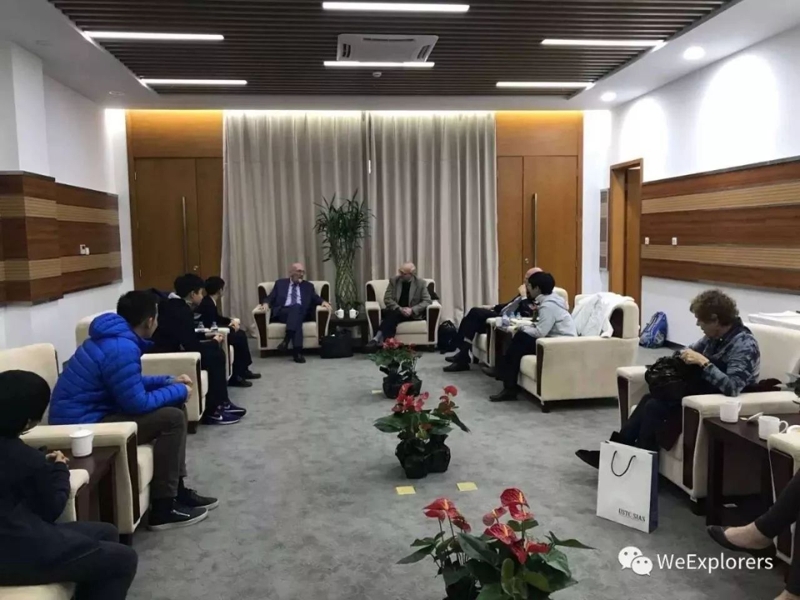编者按:12月18日在中科大上海研究院,墨子沙龙的小记者们对三位诺贝尔奖获得者进行了一次英文采访,相关内容经整理、翻译后发布如下。让我们看看上海的中学生们和诺奖得主是如何交流的吧。

Introduction: This year, three physicists were awarded the Nobel Prize for their work in the area of gravitational waves. They are Rainer Weiss, Barry Barish and Kip Thorne.
All three of them have contributed massively to the physics important to the understanding of the universe. Weiss is a professor at MIT, Barish and Thorne both used to work at CalTech, and Thorne still does scientific research and consulting (most notably for the film Interstellar from Christopher Nolan). They came to Shanghai in December and we had the luck to interview them, courtesy of Professor Pan, so here are the conversations we had.
We came back with a fresh understanding of what science truly meant.
前言:2017年10月3日,瑞典诺贝尔委员会宣布将2017年度诺贝尔物理学奖颁发给三位在引力波领域做出突出贡献的物理学家,他们是雷纳.韦斯,巴里.巴里什和基普.索恩。
他们对物理学以及人类关于宇宙的认知都做出了巨大贡献。韦斯是麻省理工学院的退休教授,而巴里什和索恩曾任职于加州理工大学。索恩目前仍然在做科学研究以及科学咨询顾问(最著名的莫过于克里斯托弗·诺兰执导的星际穿越)。三位教授在今年12月份来到了上海,而我们有幸获得了采访的机会。
在与三位科学家交流之后,我们对什么是真正的科学有了一个全新的理解。以下是采访内容。
Tanya: I’m a big fan of Interstellar, and in the movie there was lots of scenes on wormholes. I wonder if this concept is feasible in real life?
►杜若:我是星际穿越的铁杆粉丝,在电影中出现很多虫洞的场景,我想知道现实真的如此吗?
Kip Thorne: So, a number of theoretical physicists have tried to figure out whether wormholes are truly possible. And then, in conclusion, after several decades of continuous work on this beginning from 1985, my guess is that we don't know. I’m almost sure that it cannot occur naturally - so if they can occur at all they must be created by an advanced civilization. And my guess is, even an advanced civilization could not make them. But this is only a guess - we haven’t figured it out yet.
►基普·索恩:确实,很多理论物理学家都尝试去搞明白虫洞在现实中是否可能真的存在。总的来说,从1985年开始,到现在经历了数十年不间断的工作,我认为我们仍然不知道。我几乎可以确定它在自然状态下是不可能发生的,如果有,那一定是更先进的文明创造出来的。但我想即使是更先进的文明也不太可能创造出来,但这只是我的猜测,我们对此还没有完全理解。
Michael: I also have a question about when someone is getting closer to the blackhole, I mean after they crossed the horizon, will they be drawn back in time?
►雨轩:我的问题是当人穿过视界,接近黑洞的时候,有没有可能时光倒流?
Kip Thorne: So the time you experience slows if you hover over the black hole, when you don’t move, the time slows. But if you’re moving, the time slows at a different rate. You don’t feel the time slowing, but you can compare with the rest of the universe.
But since you’re inside the black hole, somebody outside can’t see you. So they cannot see how your time is slowing. But you can see the external universe, and when you compare your clock with the external universe if you’re inside the black hole, and you’re falling in, then your clock ticks more slowly. But the strange thing that happens is that if you’re inside the black hole the direction which time flows is towards the center. You think that’s a space direction, that’s really a time direction towards the center of the black hole. And that you can only move forward in time, but cannot move backwards, you are forced to move towards the center of the black hole. So moving back out, you’d be moving backwards in time. So that’s the strange thing that happens to time inside the black hole. It’s sort of weird.
►基普·索恩:如果你悬停在黑洞中,时间是变慢的,而如果你移动的话,时间是以不同的速率在变慢。你不会直观地感受到时间的变化,但你可以跟宇宙的其他生命进行比较。
既然你在黑洞里面,别人是看不到你的,他们不知道你的时间以什么样的形式在变慢,但你可以看到外面的世界,当你把钟表和外面的世界比对时,你会发现钟表走的更慢。但奇怪的事情在于当你在黑洞中时,时间的方向是朝着黑洞的中心流动的。你会认为它只是空间的方向,但朝向黑洞的中心确实是时间的方向,你只可以向前走,而不能向后退,你被迫向黑洞的中心移动。如果向外移动,你将会在时间上也向后退,所以黑洞内的时间非常奇怪。可以说有点不可思议。
Michael: So that’s very interesting, the black holes, the neutrino stars, even the particle physics…
►雨轩:我感觉很有趣,黑洞,中子星甚至是粒子物理……
Kip Thorne: These things are predicted by Einstein’s theory of relativity, and its took a long time for physicists to really understand what the mathematics were saying physically. So this is our understanding now, and it’s really confusing.
►基普·索恩:这些都是爱因斯坦相对论方程预言到的,物理学家们花了很长的时间去理解这些数学方程到底代表了什么样的物理意义,这就是我们当前的理解,但结果确实令人很困惑。
Zhining: I mean, that in a rapidly developing world right now, lots of things are happening. If you could invent or un-invent anything in the world right now, what would it be and why?
►致宁:这是一个高速发展的世界,在这个世界上正发生着许多事情,如果您能创造任何事物,或者能够让任何事物消失(Un-invent),您会怎么做?为什么呢?
Kip: I think it is better to ask the experimenters here; they are the real inventors.
►基普·索恩:我想这最好问现场的实验科学家们,他们才是真正的创造者。
Rainer: Oh lord. Un-invent, I don’t really understand.
►雷纳·韦斯:我对Un-invent不是很明白。
Kip: It’s to make it disappear.
►基普·索恩:可以理解为让事物消失。
Rainer: Oh, ok. To un- invent, I’d really like to un- invent the atomic bomb. But I’d invent a lot of things. I’d like to invent a better way of making measurements than we now make, if you could do it. By that I mean, even more precisely. That would make life a lot more easier - we don’t have to build a thing so long (LIGO facility).
►雷纳·韦斯:噢,好的,让什么事物消失。我希望我们没有创造出原子弹,但我希望创造出很多东西。我希望创造出更好、更精准的测量方法。这会让生活变得更简单——我们就不必把LIGO设备建的那么长。
Eugene: Um, so, how do you think science has affected your life?
►思敬:所以,科学对您的生活有什么影响?
Kip: How has science affected your life?
►基普·索恩(对其他两位科学家):科学对你们的生活有什么影响?
Rainer: It took me most of my time.
►雷纳·韦斯:它占据了我的大部分时间。
Barry: I think that it changes the way you see the world - its more orderly, and you are used to ask ing more questions. And I think it affects your life more generally rather than doing the science yourself from the way you think of it.
►巴里·巴里什:我想它会改变人看待世界的方式,世界会变得更有序,人更习惯于问更多的问题。我认为科学的思考方式对人平常的生活影响很大,而不只是在做科学研究的时候。
Zhining: With proving and detecting gravitational waves, how do you think that it’d affect ordinary people like us?
►致宁:您认为证实引力波存在和探测引力波对我们这样的普通人的生活会有什么影响?
Barry: Probably not at all. It’s how you think of the world around you. The kind of research we do is to understand nature, the physical world. So we don’t ask questions about how this may change our lives, or make a new product, just to understand how nature works.
I think that seeing how it would affect the world would be a misleading way to think of it, while some research did have a significant affect on the world. But that’s another individual topic. In my career, I've been close to a couple developments that people did just to understand nature, and it had a big affect on us. One was called stimulated emission which was actually predicted in Einstein’s day. And there was experiments that shows the science that created lasers. We didn't know when the science was done that it’d create lasers, but now lasers are used in everything.
A second one was done in laboratories that was near where I was working was a phenomenon called Nuclear Magnetic Resonance. Both of these led to Nobel Prizes. The Nuclear Magnetic Resonance, again, has no obvious use, but now it is used in MRI, a scanning device.
But when it was done, it was just totally for science. Other important scientific advances, some of the most important experiments, had no application at all. So what to appreciate was to understand nature better, we do get advances, but it is misleading to ask what its affects may be.
►巴里·巴里什:可能一点影响也没有。这关乎你怎么思考你周围的世界,我们做的研究在于理解自然,理解物理世界。所以我们不会问它会怎样影响我们的生活、或者怎样制造一个新产品,我们只为更好地了解自然。
我认为对科学有那样的理解会让人误入歧途。有一些研究确实对世界有重大的影响,但那是另一个话题。在我的职业生涯中,我曾经接触过很多研究,人们只为理解自然而进行的研究,它们后来同样对我们产生了重大的影响。
有一个研究叫做受激发射,人们其实在爱因斯坦的时代就预言了它的存在,有些实验能观察到激光的产生,但其中的原理在当时并不清楚。而如今激光应用可以说是无处不在。
第二个例子里的实验室距离我工作的地方很近,研究的是核磁共振的现象。受激发射和核磁共振都获得了诺贝尔奖。核磁共振当时并没有明显的用处,但是现在它应用在MRI这种医疗扫描设备中。
除此以外还有很多非常重要的科学实验,它们也许目前没有任何应用,我们要做的只是追求对自然更好的理解。我们确实取得了一些进步,但是讨论科学可能对世界产生的影响会使人对科学的理解误入歧途。



